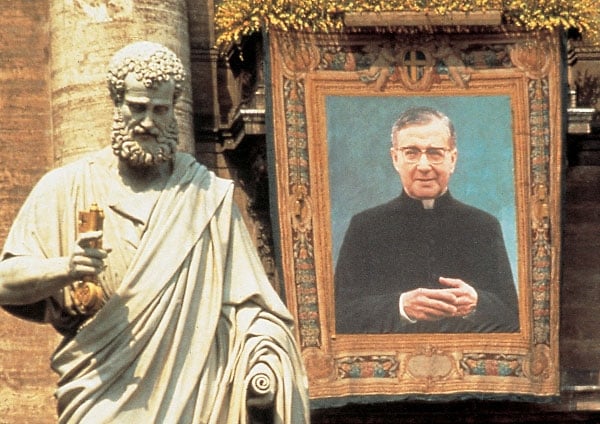Are Catholic Canonizations of Saints Infallible? Yes
On the interwebs you sometimes bump into a few Catholics that assert that canonizations are not infallible or are reversible. They will cite saints who are allegedly un-sainted (eg. St George, St Christopher, St Philomena – I explain why they are NOT un-sainted in this podcast) or they will object to canonized saints that they don’t like (eg, St John XIII or St Josemaria).

Canonizations are Infallible. Here’s why:
Concerning the Potential Problem of “Damned Saints”:
When a person is damned, he hates and curses God forever in Hell. That’s what damnation is. It’s a decision to reject God and His love. The damned person lacks all charity toward God. As Thomas Aquinas, would say, he belongs to the Kingdom of Satan. He is officially anti-Christ.
If the Church mistakingly were to canonize a damned man, then that means monks and nuns would be praying the Liturgy of the Hours and commemorating a man who currently curses God – and doing so annually in the liturgical cycle. Moreover, this would entail that priests are celebrating Masses in honor of a man who is literally diabolical. Even more so, churches, chapels, and cathedrals would be erected and consecrated in honor a man who hates God. No doubt, the devil would love all of this. So canonizations are infallible.
Concerning the Potential Problem of “Make-Believe Saints”
The same goes saints who are claimed to not have existed. If someone were to say that St George or St Christopher were make-believe people, then you have the Liturgy of Hours and Holy Mass celebrated to what amount to cartoon characters. It would be like celebrating Mass in honor of Luke Skywalker. It’s a mockery of true religion.
[Shameless plug: Check out my #1 Bestselling Historical Novel Sword and Serpent for a plausible biography of Saint George (and the “Dragon”) along with Saint Christopher by clicking here.]
We can grant that the legends and hagiography about certain saints are exaggerated or embellished, but we cannot say that the Church formally venerates imaginary people, celebrated Mass in honor of imaginary people, or that there are Churches dedicated to imaginary people.
If so, the devil would love all of this. So canonizations are infallible. It’s also worth noting that when a Pope canonizes a saint he invokes his authority as Vicar of Christ and successor to Saints Peter and Paul in a way similar to declaring dogmas infallible.
I recently wrote a history of the process of canonizations. You can read it here: “How Saints are Canonized: from Local to Papal Canonizations over Time.”
Dive Deeper

GET CONFIDENT IN YOUR FAITH
Explore the fascinating world of Catholic teachings with Dr. Marshall. Together you’ll unpack the brilliant answers the Church gives to tough questions about the Faith. The best part: you go at your own pace. Start this exciting journey today.

